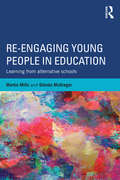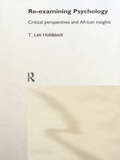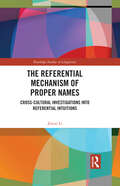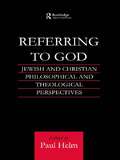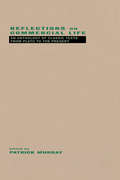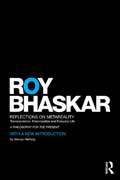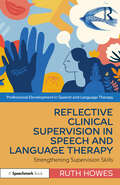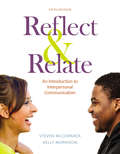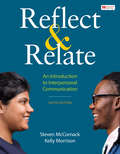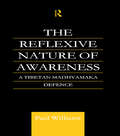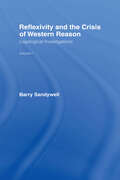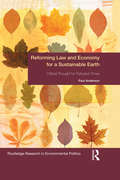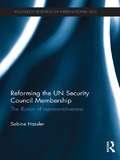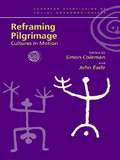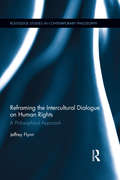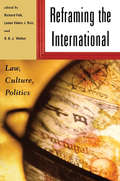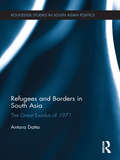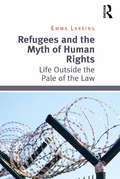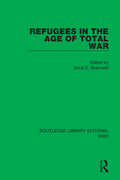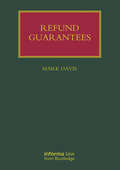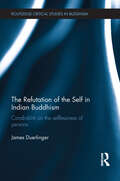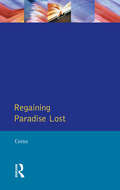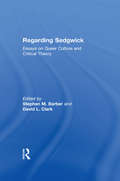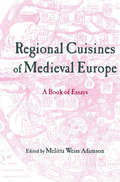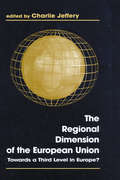Special Collections
Benetech’s Global Certified Accessible Titles
Description: Benetech’s GCA program is the first independent third-party EPUB certification to verify ebook accessibility. By creating content that is born accessible, publishers can meet the needs of all readers. Learn more: https://bornaccessible.benetech.org/
- Table View
- List View
Re-engaging Young People in Education
by Martin Mills and Glenda McGregorMany young people failed by the school system are those who face a range of social and economic challenges due to multiple forms of injustice. This book provides an insight into the educational practices that work to re-engage young people who have become disenchanted with traditional schooling. It examines the lives of students and workers who participate in education sites on the fringes of mainstream education, and includes a rich tapestry of personal experiences from those who have been failed by their schooling experiences. The book draws upon research of international relevance conducted in a range of ‘Flexible Learning Centres’ and ‘democratic schools’ in Australia and the UK; it suggests that improving the retention levels of young people in formal education will require schooling practices to change. Students who have become disengaged from mainstream schooling do re-engage in the learning process of many alternative schools, indicating that teaching practices and forms of organisation which work in alternative sites can also provide lessons for mainstream schooling, thereby encouraging a more socially just education system.Included in the book: contexts of contemporary schooling who chooses flexible learning centres and why democratic schools: students and teachers working together teaching in ‘the margins’ case studies: ‘oppositional alternatives’. All young people have the capacity to learn and to enjoy learning; they do not ‘fail school’, rather, schools fail them. The teachers, workers and students who have shared their stories provide significant insights into how we might change this situation, and the book will be invaluable reading for postgraduates and researchers in the fields of education, the sociology of education, school reform and social work.
Re-examining Psychology
by Len T. HoldstockFirst published in 2004. Routledge is an imprint of Taylor & Francis, an informa company.
The Referential Mechanism of Proper Names
by Jincai LiEach of us bears a unique name given to us at birth. When people use your name, they typically refer to you. But what is the linkage that ties a name to a person and hence allows it to refer? Li’s book approaches this question of reference empirically through the medium of referential intuitions. Building on the literature on philosophical and linguistic intuitions, she proposes a linguistic-competence-based account of referential intuitions. Subsequently, using a series of novel experiments, she investigates the variation of referential intuitions across different cultures, as well as the developmental trajectory and the underlying causes of the observed cultural differences. What she finds is that the cultural patterns of referential intuitions are already in place around age seven, and the differences are largely attributable to the distinct perspective taking strategies favoured by easterners and westerners, rather than the moral valence of actions involved in the experimental materials. These results are taken to better support referential pluralism (in particular, the ambiguous view) than referential monism. By undertaking this fascinating research, Li’s book provides new insights into the cognitive mechanisms underlying people’s referential usage of names. It will be valuable to students and scholars of linguistics, philosophy of language and experimental philosophy, and in particular, to those who research into semantic intuitions and theories of reference.
Referring to God
by Paul HelmThere is a long tradition of discussion in the philosophy of religion about the problems and possibilities involved in talking about God. This book presents accounts of the problem within Jewish and Christian philosophy.
Reflections on Commercial Life
by Patrick MurrayReflections on Commercial Life, an anthology of writings, from the ancient Greeks to contemporary thinkers, provides students, scholars, and general readers an opportunity to develop a more self-conscious and critical relationship to commercial life. Selections are drawn from seminal works of high intellectual and literary quality. Through an inquiry into history, nature, and outcomes, this volume offers the opportunity to explore, as never before, alternatives to modern commercial life.
Reflections on metaReality
by Roy BhaskarReflections on meta-Reality is now widely regarded as a landmark in contemporary philosophy. It initiates the philosophy of meta-Reality, the third main phase of Roy Bhaskar’s philosophical thoughts, after original or basic critical realism and dialectical critical realism. Originally published in 2002 and based on talks given in India, Europe and America, Roy Bhaskar presents his new philosophy of meta-Reality as a radical extension, systematic development and proleptic completion of critical realism. This brilliant series of studies contains seminal and far-reaching discussions of critical realism and the nature of being; an incisive and limpid account of modernity, modernism and post-modernism; a sublime discourse on the nature of the self and compelling considerations on the relationship between social science and self-realization. Together, they demonstrate the ubiquity of transcendental phenomena in everyday life and the orientation of enlightenment towards collective human emancipation and universal self-realization. A new introduction to this edition by Mervyn Hartwig, founding editor of The Journal of Critical Realism and editor of A Dictionary of Critical Realism (Routledge, 2007), describes the context, significance and impact of Reflections on meta-Reality, and supplies an expert guide to its content. This book is essential reading for students and practitioners in both philosophy and the human sciences.
Reflective Clinical Supervision in Speech and Language Therapy
by Ruth HowesThis book de-mystifies supervision in speech and language therapy, focusing on the practicalities and pitfalls. Clinicians are encouraged to reflect on their individual style as a supervisor and the tools they utilise to make a successful supervisory relationship. Drawing on previous experience, Howes offers a combination of reflective, solution-focused, and strengths-based approaches, covering topics such as: The importance of the supervisory conversation Ways to ensure conversations are reflective and appreciative, supportive yet challenging The training needed to be effective supervisors and ‘good supervisees’ The functions of supervision and how these change over time for each clinician, from learning new clinical skills to support in time and energy management Practical resources for busy clinicians, making it a manual of insights and support for supervision in SLT Reflective Clinical Supervision in Speech and Language Therapy will be an invaluable guide for all speech and language therapists who are either experienced or newly established supervisors supporting others with the complexities of casework and the stress of relationships in every busy working day.
Reflect & Relate
by Steven McCornack and Kelly MorrisonIn Reflect & Relate, distinguished teacher and scholar Steve McCornack provides students with the best theory and most up-to-date research and then helps them relate that knowledge to their own experiences. Engaging examples and a lively voice hook students into the research, while the book's features all encourage students to critically reflect on their own experiences. Based on years of classroom experience and the feedback of instructors and students alike, every element in Reflect & Relate has been carefully constructed to give students the practical skill to work through life’s many challenges using better interpersonal communication. The new edition is thoroughly revised with a new chapter on Culture; new, high-interest examples throughout; and up-to-the-moment treatment of mediated communication, covering everything from Internet dating to social media.
Reflect & Relate
by Steven McCornack and Kelly MorrisonCurrent, inclusive, and authoritative, Reflect & Relate, Sixth Edition, has set the new standard for interpersonal communication texts. Steve McCornack and Kelly Morrison, both distinguished scholars and award-winning teachers, draw on their twenty-five years of classroom experience to connect classic and current communication theory and research to the actual lives of today's students.For the sixth edition, the authors built on their leading gender coverage by partnering with an advisory board of culturally responsive-sustaining pedagogy leaders to create an even more inclusive text that models for and guides students in culturally self-aware and inclusive communication. The revision features over 300 new scholarly citations, and responds to the real and growing interpersonal challenges students currently face: how to form positive relationships to support health and wellness, within increasingly online contexts, and with people who have a variety of backgrounds, abilities, and experiences. Additionally, coverage of mediated communication—its advantages, as well as its challenges—has been thoroughly updated to support students in today's digital world.LaunchPad for Reflect & Relate includes the full e-book along with powerful assessments, a full video library, LearningCurve adaptive quizzing, and Making Relationship Choices video activities to support you and your students—whether you are teaching face-to-face or online, synchronously or asynchronously.
The Reflexive Nature of Awareness
by Paul WilliamsPlaces the controversy initiated by the Tibetan Tsong kha pa - who elaborated on one of the eight difficult points in understanding Madhyamaka philosophy - in its Indian and Tibetan context.
Reflexivity And The Crisis of Western Reason
by Barry SandywellThis ground breaking work explores the genealogical analysis of the discourses of reflection. Barry Sandywell traces the differences between the traditional discourses of reflection and the experiences of reflexivity in everyday, social and philosophical thought. Brilliantly organised and abounding with astonishing insights, Reflexivity and the Crisis of Western Reason offers a fundamental challenge to our normal ways of viewing social thought.
Reforming Law and Economy for a Sustainable Earth
by Paul AndersonFew concerns preoccupy contemporary progressive thought as much as the issue of how to achieve a sustainable human society. The problems impeding this goal include those of how to arrest induced global environmental change (GEC), persistent disagreements about the contribution of economic activities to GEC and further differences in views on how these activities can be reformed in order to reduce the rate of change and thus to mitigate threats to much life on Earth. Reforming Law and Economy for a Sustainable Earth aims to help resolve these problems in two ways. Since addressing GEC will require global coordination, the book first clarifies the conditions necessary to achieve this effectively. Paul Anderson explores these conditions with the aid of a sustained analysis of key concepts in influential disciplines, particularly in social and political theory and law, relating to the transition to a sustainable economy. Second, Anderson tackles the problem of how to arrest GEC by incisively evaluating two leading theoretical positions in terms of their capacity to support the conditions required for effective global coordination. From this basis, the book offers an extensive critique of the idea that global environmental problems can be solved within the framework of global capitalism. It also critically reviews and advances the proposition that global sustainability can be achieved only by changing the capitalist form of organizing the economy. Enriched by a genuinely interdisciplinary approach, the originality of Reforming Law and Economy for a Sustainable Earth lies in the manner it combines a rigorous analysis of the requirements for global sustainability with decisive conclusions as to what are, and what are not, viable means of fulfilling those requirements. The book advances research on sustainability within key disciplines, among them political theory, law and social science, by offering a timely and insightful statement about the global environmental predicament in the 21st century.
Reforming the UN Security Council Membership
by Sabine HasslerThis book comprehensively examines the different proposals put forward for reforming the UN Security Council by analysing their objectives and exploring whether the implementation of these proposals would actually create a representative and more effective Security Council. The book places the discussion on reform of Security Council membership in the context of the council’s primary responsibility, which is at the helm of the UN collective security system. The author contends that only a Council that is adequately representative of the UN membership can claim to legitimately act on the members’ behalf. This book offers an inquiry into the Council’s constitutional framework and how far that framework still reflects the expectations and intentions of the founding nations, whilst remaining flexible enough to satisfy today’s, and possibly tomorrow’s, membership. Through the use of policy-oriented jurisprudence and elements of the International Law/International Relations theory this book explores how reform can best be realised. Reforming the UN Security Council Membership will be of particular interest to scholars and students of International Law and International Relations.
Reframing Pilgrimage
by Simon Coleman and John EadeReframing Pilgrimage argues that sacred travel is just one of the twenty-first century's many forms of cultural mobility. The contributors consider the meanings of pilgrimage in Christian, Mormon, Hindu, Islamic and Sufi traditions, as well as in secular contexts, and they create a new theory of pilgrimage as a form of voluntary displacement. This voluntary displacement helps to constitute cultural meaning in a world constantly 'en route'. Pilgrimage, which works both on global economic and individual levels, is recognised as a highly creative and politically charged force intimately bound up in economic and cultural systems
Reframing the Intercultural Dialogue on Human Rights
by Jeffrey FlynnIn this book, Flynn stresses the vital role of intercultural dialogue in developing a non-ethnocentric conception of human rights. He argues that Jürgen Habermas’s discourse theory provides both the best framework for such dialogue and a much-needed middle path between philosophical approaches that derive human rights from a single foundational source and those that support multiple foundations for human rights (Charles Taylor, John Rawls, and various Rawlsians). By analyzing the historical and political context for debates over the compatibility of human rights with Christianity, Islam, and "Asian Values," Flynn develops a philosophical approach that is continuous with and a critical reflection on the intercultural dialogue on human rights. He reframes the dialogue by situating it in relation to the globalization of modern institutions and by arguing that such dialogue must address issues like the legacy of colonialism and global inequality while also being attuned to actual political struggles for human rights.
Reframing the International
by Richard Falk and Lester Edwin J. Ruiz and R. B. J. WalkerRe-Framing the International insists that, if we are to properly face the challenges of the coming century, we need to re-examine international politics and development through the prism of ethics and morality. International relations must now contend with a widening circle of participants reflecting the diversity and uneveness of status, memory, gender, race, culture and class.
Refugees and Borders in South Asia
by Antara DattaThe crisis in East Pakistan in 1971, which preceded the birth of Bangladesh, led to ten million refugees crossing the border into India. This book argues that this massive influx of refugees within a few short months changed ideas about citizenship and belonging in South Asia. The book looks at how the Indian state, while generously keeping its borders open to the refugees, made it clear that these refugees were different from those generated by Partition, and would not be allowed to settle permanently. It discusses how the state was breaking its ‘effective’ link between refugees and citizenship, and how at the same time a second ‘affective’ border was developing between those living in the border areas, especially in Assam and West Bengal. Moving beyond the refugee narratives created by Partition, this book argues that these ‘effective’ and ‘affective’ borders generated by the refugee crisis in 1971 form part of the longer historical trajectory of the current political debate regarding ‘illegal infiltration’ from Bangladesh . It goes on to analyse the aftermath of the 1971 war and the massive repatriation project undertaken by the governments of India, Pakistan and Bangladesh to examine ways in which questions about minorities and belonging remained unresolved post-1971. The book is an interesting contribution to the history of refugees, border-making and 1971 in South Asia, as well as to studies in politics and international relations.
Refugees and the Myth of Human Rights
by Emma LarkingMost Western liberal democracies are parties to the United Nations Refugees Convention and all are committed to the recognition of basic human rights, but they also spend billions fortifying their borders, detaining unauthorised immigrants, and policing migration. Meanwhile, public debate over the West’s obligations to unauthorised immigrants is passionate, vitriolic, and divisive. Refugees and the Myth of Human Rights combines philosophical, historical, and legal analysis to clarify the key concepts at stake in the debate, and to demonstrate the threat posed by contemporary border regimes to rights protection and the rule of law within liberal democracies. Using the political philosophy of John Locke and Immanuel Kant the book highlights the tension in liberalism between partiality towards one’s compatriots and the universalism of human rights and brings this tension to life through an examination of Hannah Arendt’s account of the rise and decline of the modern nation-state. It provides a novel reading of Arendt’s critique of human rights and her concept of the right to have rights. The book argues that the right to have rights must be secured globally in limited form, but that recognition of its significance should spur expansive changes to border policy within and between liberal states.
Refugees in the Age of Total War
by Anna C. BramwellThis book, first published in 1988, charts society’s responses to the huge numbers of refugees in Europe and the Middle East during and after the Second World War. At the close of the war large areas of Europe lay in ruins, and large numbers of refugees faced upheaval and famine. Political considerations influenced the decisions as to who received assistance, and refugees were forcibly repatriated or resettled – and in the analysis of these matters and more, both the refugee crises of the 1940s and their relevance today are highlighted.
Refund Guarantees
by Mark DavisA refund guarantee is an essential component of almost every shipbuilding project, without which the buyer will be unwilling or unable to proceed. There is no standard form of refund guarantee in universal usage, and both the form and substance of refund guarantee instruments vary widely from case to case. The ambiguity or uncertainty of the meaning of refund guarantee instruments, against a backdrop of a sharp downturn in the shipping markets, has led to numerous disputes in recent years concerning refund guarantees, which have been the subject of a number of important decisions of the English Courts. This is the first English law text book dedicated to the subject of refund guarantees. It provides essential guidance as to the issues arising and the pitfalls to be avoided. It analyses the specimen form of guarantee annexed to Bimco’s NEWBUILDCON form, and covers topics such as the circumstances in which the liability of the guarantor may be discharged, and when a builder may be entitled to obtain an injunction to restrain payment under a refund guarantee. It will be an essential and practical guide for those engaged in the shipbuilding industry, including shipbuilders, shipowners, banks and insurance companies, P&I clubs, and those advising them.
The Refutation of the Self in Indian Buddhism
by James DuerlingerSince the Buddha did not fully explain the theory of persons that underlies his teaching, in later centuries a number of different interpretations were developed. This book presents the interpretation by the celebrated Indian Buddhist philosopher, Candrakīrti (ca. 570–650 C.E.). Candrakīrti’s fullest statement of the theory is included in his Autocommentary on the Introduction to the Middle Way (Madhyamakāvatārabhasya), which is, along with his Introduction to the Middle Way (Madhyamakāvatāra ), among the central treatises that present the Prāsavgika account of the Madhyamaka (Middle Way) philosophy. In this book, Candrakīrti’s most complete statement of his theory of persons is translated and provided with an introduction and commentary that present a careful philosophical analysis of Candrakīrti’s account of the selflessness of persons. This analysis is both philologically precise and analytically sophisticated. The book is of interest to scholars of Buddhism generally and especially to scholars of Indian Buddhist philosophy.
Regaining Paradise Lost
by Thomas N. CornsParadise Lost is not merely the masterpiece of John Milton (1608-74) but a turning point in style and form, which had a profound influence on the poetry of the following century. Divided into two parts, this major survey begins by discussing the revolutionary characteristics of Paradise Lost in the context of contemporary literary norms and examines the theological, psychological, stylistic and narrative innovation in the poem. It then provides a fuller account of the complex, and now obscure political, and theological issues and other issues that Milton's poem addresses and sought to resolve. It concludes by examining the themes discussed in the light of the influence of the poem on the tradition of English literature.
Regarding Sedgwick
by David L. Clark and Stephen M. BarberEve Kosofsky Sedgwick is one of the most important figures in the history of modern gender studies. This book, which features an interview with Sedgwick, is a collection of new essays by established scholars
Regional Cuisines of Medieval Europe
by Melitta Weiss AdamsonExpert food historians provide detailed histories of the creation and development of particular delicacies in six regions of medieval Europe-Britain, France, Italy, Sicily, Spain, and the Low Countries.
The Regional Dimension of the European Union
by Charlie JefferyDecision-making within the EU has moved to a third (regional) level of government emerging in the EU policy process alongside the first (Union) and second (member state) levels. Multi-level governance can increasingly be identified. These papers describe and analyse this third level.
